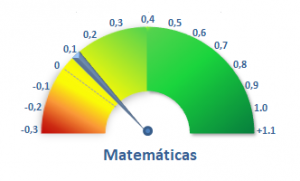Implementing institution: Ark UK Programmes
Country: United Kingdom
Source: Education Endowment Foundation
Execution period: 2012 - in progress
Plataforma de Prácticas Efectivas:
Improve comprehension, enjoyment, and achievement in math.
A comprehensive teacher training program that includes an online platform with teaching materials.
The students who received the program in elementary school, progressed with respect to the identified group (+0.10 SD).
Mathematics Mastery (MM) is a mathematics teaching program for elementary and secondary school students that includes trainings for the professional development of teachers. Adapted from a method developed in Singapore and Shanghai, the Mathematics Mastery program offers students a “learning by doing” approach to deepen and increase their knowledge of key mathematical concepts.
Compared to traditional curricula, Mathematics Mastery addresses fewer topics, but with greater depth. Through a variety of visual media (objects and images), students are encouraged to physically represent theoretical mathematical concepts. To do this, they have to solve practical problems based on everyday experience, which allows students to put themselves in a concrete situation so that they identify, understand and apply relevant mathematical principles, making connections among different ideas. The program is developed through two components:
In addition, the platform connects the different teachers involved in the program, through an online hub, in such a way that they form a common learning network about their experiences. The NGO Ark UK Programmes also organizes National Leadership Days once a year, during which teachers work in small groups to share and highlight good practices.
In England, the enrolment of children at elementary and secondary levels covers almost the entire population of attendance age (99.85% and 98.28% respectively by 2014). Net participation rates have been growing since 2006, especially at the secondary level (+6 percentage points). However, the Report of the International Programme for Student Assessment, or PISA Report of the OECD, has shown, for example, levels of mathematical comprehension by the English population of 15 years of age, at a level just above the average of the advanced countries (492 against 490 respectively).
This evaluation shows that there are countries such as Finland, Australia, Austria, among others, that achieve better performance, which indicates that there are still great margins of progress for England. Based on the situation described above, the English Ministry of Education has made the training of 17,500 additional teachers in mathematics and physics one of its core objectives (2015-2020 plan).
In 2012, the Education Endowment Foundation (EEF) funded the evaluation of the Mathematics Mastery program to determine its impact in terms of increasing students’ mathematical abilities. For this purpose, the Institute of Education of the University of London (IOE) selected 83 schools spread between London and the South-West regions, with a random sample of 4,176 students. The program was implemented under a randomized controlled experiment (RCT) in 42 schools (intervention group) throughout the first year of elementary school.
A subsequent triangulation with other evaluations of the program helped the experts to appreciate its results. For an overall cost of £7,460 (US$9,350) in the first year of program implementation, the study highlighted a marked increase in the initial level of students participating in the program compared to those in the intervention group (+0.10 SD), which can be interpreted as 2 months of progress. However, this result was not statistically valid. On the contrary, a second study, also with experimental evaluation, has shown a statistically significant average impact of one month of additional progress for grade 7 students. Given that the cost per student is relatively low (US$ 163 per student per year) compared to other programs, Mathematics Mastery can represent a timely methodology in contexts that have the same characteristics.
Impact of interventions:

Charts: Impact measured in standard deviations of the intervention group compared to the control group
Link: https://www.mathematicsmastery.org/
Contacto: info@mathematicsmastery.org
Report: Ver informe
Other documents:
Tags: